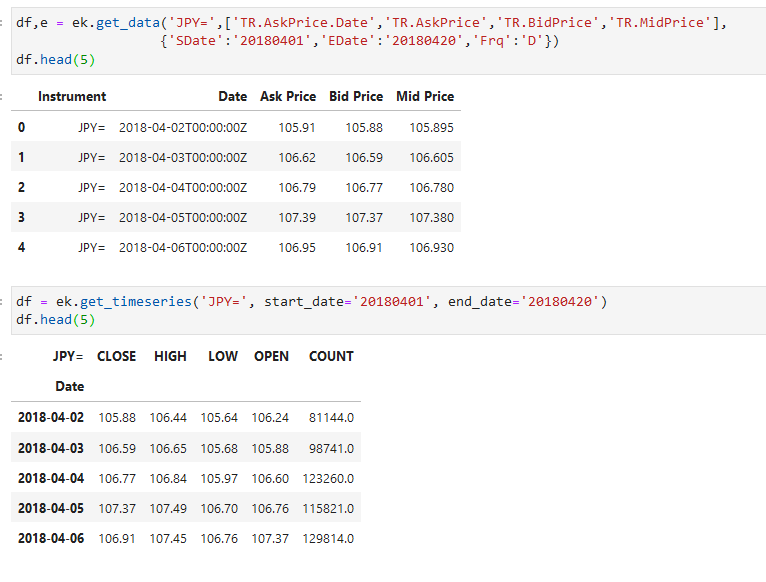Is there a method using python api to get Value Dates for a certain market ex: FX, IRS, etc.
Similar to exiting web interface https://dxtra.markets.reuters.com/dx/dxnrequest.aspx?RequestName=ReqCi&RequestType=ValueDates
Thanks
For a deeper look into our Eikon Data API, look into:
Overview | Quickstart | Documentation | Downloads | Tutorials | Articles
Is there a method using python api to get Value Dates for a certain market ex: FX, IRS, etc.
Similar to exiting web interface https://dxtra.markets.reuters.com/dx/dxnrequest.aspx?RequestName=ReqCi&RequestType=ValueDates
Thanks

If you only need maturity date for instruments with the trade date of today, then you can get it from market data record using Eikon Data APIs, e.g. for 3 month GBPCHF forward use
ek.get_data('GBPCHF3M=','MATUR_DATE')
For 10Y USD semi-annual bond vs. 3 month LIBOR swap use
ek.get_data('USDSB3L10Y=','MATUR_DATE')
If you need to calculate the maturity date for an instrument with an arbitrary trade date, you can use Instrument Pricing Analytics service on Refinitiv Data Platform. Or you could use AdfinX Analytics COM library to perform such calculation, although using AdfinX Analytics COM library in Python is a but cumbersome and only possible in 32-bit Python. To see what's involved check out the article titled "Using AdfinX Analytics in Python".

Hi @VSIDOR
This is an example to get timeseries data for JPY=

Please review the quick start at https://developers.refinitiv.com/en/api-catalog/eikon/eikon-data-api/quick-start

Thanks, this doesn't answer the question. For a certain tenor ex: 10y what is the value date for certain market (taking into account holidays, weekends etc)
Hi @VSIDOR
I do not understand the content(tenor ex: 10y) in your question.
I suggest that you contact the Refinitiv Content Helpdesk to demonstrate how to retrieve the same information using =TR function in Eikon Excel.
Then you can replicate the same using get_data() function on Python with the same instrument codes and field names.
Hi @VSIDOR
Please see Alex's answer on this post:
Then see this post for how to use Adfin on Python:
